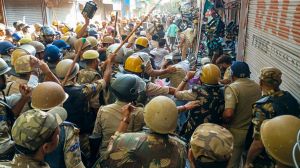New birds in the sky
After a long delay, Indian Airlines and Air India have decided to bolster their fleet. Five A-320 aircraft are being inducted into IA on dry...

After a long delay, Indian Airlines and Air India have decided to bolster their fleet. Five A-320 aircraft are being inducted into IA on dry lease. This was long overdue. The airline is facing tough competition in the domestic sector.
AI has decided to buy 10 long-range Airbus planes and 18 short-range planes from Boeing. The deal is expected to be worth Rs 10,000 crore. The planes would be acquired over five years to replace 14 existing aircraft, taken on dry lease. These include 11 Airbus 310 and three Boeing 747-200. The country should get the best and most transparent deal.
Alliance Air too needs a complete overhaul. It provides feeder services but has been languishing in the cold. The average age of its fleet is over 21 years. Passengers board Alliance Air flights only when they have no choice. The government has geared into action, but the expansion is expected to take some time. I don’t think Alliance Air can bear this delay. It would virtually ground the airline.
It is thanks to former prime minister Rajiv Gandhi that IA is still flying. He had the vision and courage to purchase new aircraft for which he was criticised. But with the benefit of hindsight, his critics realise those purchases saved IA.
Meanwhile, some steps have been taken to make flying more comfortable. Ladder point frisking has been discontinued. Plastic cutlery has given way to steel. Mobiles have started ringing again. Photography is no longer prohibited in civil airports. Even so a lot needs to be done, in terms of service and customer comfort, for IA to keep its nose ahead of the pack.
To put an end to strikes and stoppages, the government is considering divesting pilots and senior officers of privileges under the Industrial Disputes Act. MPs on Parliament’s consultative committee on civil aviation have supported the view. Even Left MPs, who opposed such action in the past, have backed it. How can a person drawing lakhs of rupees a month be treated as an ordinary worker and avail protection under a law made for labourers?
Education for all as free for all
The experts in the HRD Ministry are set to sound the death knell of private education. A perfectly-timed populist measure titled ‘‘Free and Compulsory Education for Children Bill, 2003’’, to be presented in the winter session of Parliament, is a test case for the law of unintended consequences.
According to the bill, ‘‘The attendance authority shall have powers to direct recognised but not substantially-aided schools to give admission, in a manner as prescribed, without any fees or any other charges to children below the poverty line from the local body area.’’ The bill elaborates, ‘‘The upper limit for admitting such children would be 20 per cent of the total strength of the school.’’ But the icing on the cake is, ‘‘The children under this category shall be chosen by the local authority concerned.’’
I have a few apprehensions. In the first place it is not clear on what basis the candidates will be selected. Will the poorest children get selected or will the criteria be a mix of poverty and merit? If the latter, how do we decide the academic merit of students getting into class I?
Is it not obvious seats reserved under this bill would become cash cows for local authorities and half the candidates would be their relatives? The government is resorting to a pathetic short cut, without exploring alternative methods of providing low-cost education. The proposed measure will only discourage private players, reducing the number of schools in the long run.
Playing ball with Pakistan
If all goes well, the Indian cricket team will soon be touring Pakistan, after 14 years, for a full test and one-day series. India last toured Pakistan in 1989 and drew all four tests. Jagmohan Dalmiya, the BCCI president, and his Pakistani counterpart discussed the matter during a recent ICC meeting in the West Indies. Thanks to the government’s decision to allow bilateral cricket ties, the series could take place in March 2004.
It has been long since the two teams met on a cricket field, even though the two armies have met on the battlefield. It would be in the interest of both countries to put political rivalries behind them — and enjoy a good game of cricket.
(The author is a Congress MP)





- 01
- 02
- 03
- 04
- 05


























